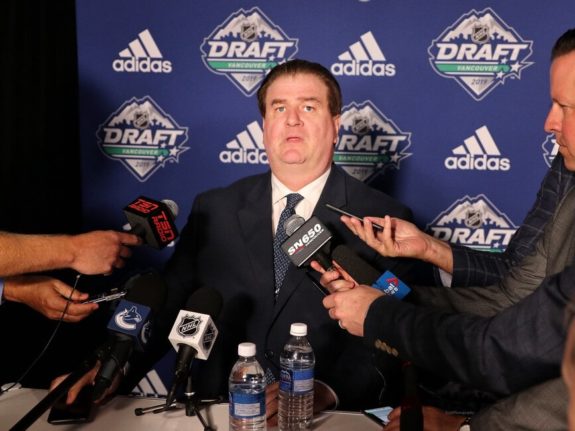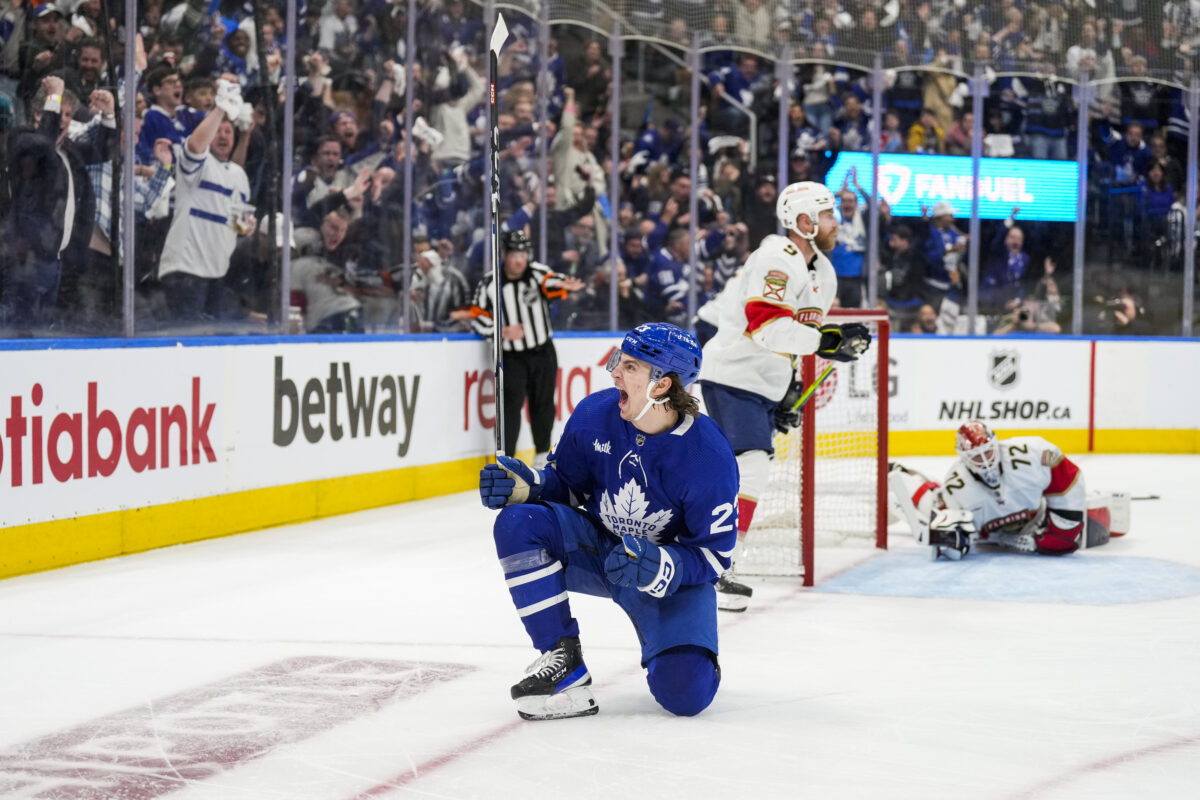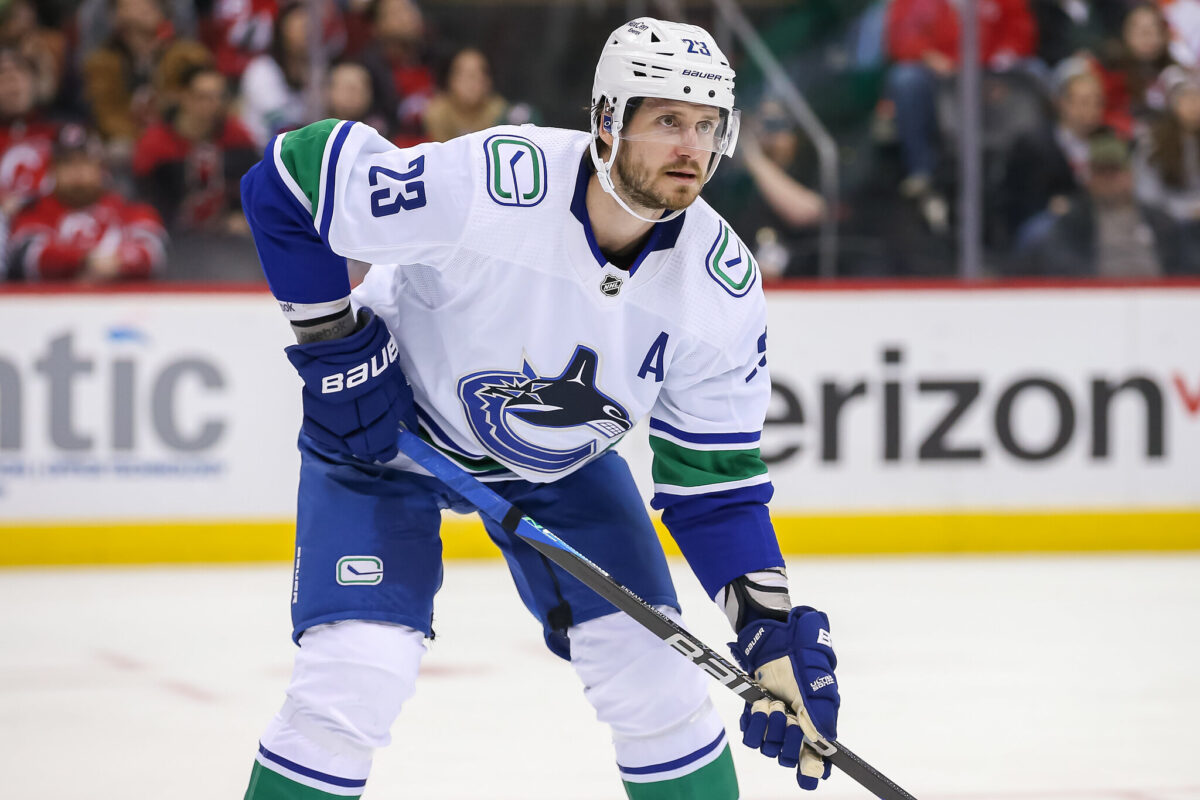The Toronto Maple Leafs fired general manager (GM) Kyle Dubas on May 19. Rumors speculating the exact reason the team, and specifically, team president Brendan Shanahan, decided to move on from Dubas is filling the minds of fans and media alike. Although, there’s a different rumour that is also sparking hope, headache, and head scratches—who will be the next Toronto Maple Leafs’ GM? Shanahan made it clear he wants his next colleague to have experience. Immediately names began to be tossed into the Twitter void. Names like Eric Tulsky, Brad Treliving, and maybe even promoting Brandon Pridham from his role as assistant GM. However, to the dismay of Maple Leafs’ fans everywhere, former Canucks GM Jim Benning’s name lurks as a doomsday scenario.
How Benning Is Linked to the Maple Leafs
The Canucks hired Benning on May 21, 2014, and fired him on Dec. 5, 2021. He spent seven years, six months, and 14 days as GM for the team; evidently, experience in the role is fine. Under his control, the Canucks made the playoffs twice, in 2015 and 2020, never progressing past the second round. Benning’s infamous for his questionable management of the cap, poor free-agency decisions, and so-so trade record. His greatest strength, drafting, also proved to be one of his greatest areas of regret. While no official reports solidify interest from the Maple Leafs, his name brings intrigue, despite the unlikeliness of it all.

Benning’s playing time with Maple Leafs also slightly links him to the organization. He played for them from the 1981-82 season to 1986-87. In his time with the Maple Leafs, he appeared in 364 games, scoring 37 goals and 136 assists for 173 points while having a plus/minus of minus-86. The teams Benning played for missed the playoffs in all but one season, but his scoring totals were respectable as a defenseman. Former players returning as GM is a route some organizations like to take, as familiarity helps with relations within ownership, even if ownership is different than it was nearly 40 years ago. His experience as a former GM and familiarity with the organization fits Shanahan’s wants. It will be their decision whether the Maple Leafs opt for a person with rash decision-making, different from Dubas’ analytical approach.
Benning’s History of Cap Management
Benning’s questionable history of cap management is the most worrying prospect of him entering the Maple Leafs’ vacant management role. Famously, it is Benning’s signings on the opening day of free agency that brought the most criticism to his time with the Canucks, rather than his drafting or trades. The list of albatross contracts handed out by Benning is long, but the most egregious consist of Louis Eriksson, six years, $36,000,000; Tyler Myers, five years, $30,000,000; Antoine Roussel, four years, $12,000,000; and Erik Gudbranson, three years, $12,000,000. He is signing secondary options to sizable contracts that sneakily eat up cap space. His negotiations for big-name players surprisingly result in fair to even outstanding contracts, such as Bo Horvat’s first long-term deal.
Related: Kyle Dubas is Officially Out as GM of the Toronto Maple Leafs
Despite what many may think, the Maple Leafs were historically great at managing the cap around their superstars during the Dubas era, something Benning is not. While Auston Matthews, Mitch Marner, and John Tavares all make above $10 million each against the cap, their ability to construct competitive teams using loopholes, shenanigans, and intense cap-crunching calculations would make the transition from Dubas to Benning jarring. Granted, Pridham, the Maple Leafs’ cap wizard, receives credit for their impressive money management. For example, he made it logistically possible for the Maple Leafs to trade for Jake McCabe, Sam Lafferty, Ryan O’Reilly, and Noel Acciari at the 2023 NHL Trade Deadline, while calculating the space needed to sign Matthew Knies at the season’s end.

Benning’s greatest struggle is handing out contracts to average-depth pieces. He overpays them by $1-2 million in free agency, killing cap space. His biggest flaw would be the most damaging effect hiring Benning would have on the Maple Leafs, as with Matthews, Marner, Tavares, and Rielly making so much money, having a GM willing to commit term and salary to depth pieces would result in needing trades to unload the contracts later on, or having to part ways with core players. If the Maple Leafs hire him, and Pridham remains, the dynamic between the two could improve Benning’s salary management, making him an arguably above-average GM, or see the two butt-heads until one leaves through resignation or getting fired. Nevertheless, the cap clash between the two would be an interesting dynamic.
Look at Some of Benning’s Trades With Canucks
One thing people cannot take away from Benning’s time with the Canucks is his willingness to make a risky trade. If there is a player he wants on his team, he will move mountains until he gets them. Take Oliver Ekman-Larsson, for example, whom Benning traded the ninth-overall pick in the 2021 NHL Entry Draft, a 2022 second-round pick, and expiring contracts for him and forward Conor Garland. Despite his ambition, the trade did not work out.

The J.T. Miller trade, probably Benning’s best trade during his tenure, was criticized immediately. The Tampa Bay Lightning were looking to dump salaries entering a tightly cap-contested summer in 2019. The Canucks acquired Miller for a protected 2020 first-round pick, a third-round pick, and a roster player. Miller’s career renaissance made Benning look like a genius, showing his capability to make a positive franchise-altering trade. Benning’s trades are hit-and-miss. He can sell talent well, for example, making the most out of the Ryan Kesler trade near the beginning of his tenure with the Canucks. Although, considering the Maple Leafs are looking to contend, analyzing his ability to maximize value while selling off players shows his negotiating skill, not his ability to build a roster capable of contention.
Benning’s Public Speaking Versus Maple Leafs Quota
Since Shanahan took over, the Maple Leafs’ management core has been purposeful when speaking. When Shanahan or former GMs Dubas and Lou Lamoriello spoke in front of a microphone, their words were succinct and meaningful. Part of the reason Dubas is no longer a part of the organization is because he went off-script at his end-of-season press conference. Following the presser, Dubas immediately released a cryptic farewell tweet, subtly throwing shade at Shanahan while thanking the Maple Leafs. This is important, as Benning is not the most charismatic GM in the NHL.
In no way is Benning a bad public speaker—you do not become an NHL GM by not being able to articulate words well. This issue lies in his ability to get tongue-tied by questions or his inability to come up with non-answers on the spot. What Lamoriello, current New York Islanders GM, does so well, and what he helped introduce to the Maple Leafs’ organization, is not giving the media an inch of material. Of course, the media hates this. It is this ability, something the current Maple Leafs’ regime cherishes, that Benning does poorly. Aside from his spending habits, this would be his second biggest challenge if he did become GM.
Benning’s Drafting History With Canucks
Benning’s drafting with the Canucks is just ok. His first-round draft selections fluctuate from busts to superstars, with 2015 first-round pick Brock Boeser residing in the middle of the two extremes. Selecting Elias Pettersson fifth overall in 2018 was one of the most intelligent decisions of his tenure. Quinn Hughes, the Canucks’ cornerstone blueliner and undisputed top-five offensive defenseman in the NHL, is also credited to Benning. Aside from these players, he has significant misses. Olli Juolevi at No. 5 in 2016 is his most infamous, as the Calgary Flames selected Matthew Tkachuk with the next pick. Jake Virtanen and Vasily Podkolkin are also notable top-10 picks who proved disappointing.
After the first round, Benning’s success with the Canucks also falters. The only prominent names from his 2014-2021 drafts are Gustav Forsling, Adam Gaudette, Kole Lind, Guillaume Brisebois, and Nils Höglander. They are not bad names, but nothing compared to other organizations’ track records in the later rounds. The Maple Leafs provide their scouting department with ample funds, so Benning would have all the resources to research and discover players at his will. Although, with what he has shown thus far, his drafting is a discouraging sign.
Related: Maple Leafs GM Kyle Dubas Should Be Considered Team’s MVP
The Maple Leafs are likely to stay away from Benning. While drafting Pettersson picks ahead many thought he would go, drafting Hughes and many other decisions are bright spots on his resume; they are merely blips rather than a continuous trend. If Benning becomes the next Maple Leafs’ GM, Canucks fans, and fans of the NHL as a whole, will laugh. His biggest challenge, cap management, would be put to the test immediately if hired. Fortunately for Maple Leafs’ fans, Benning will likely never touch the executive booth at Scotiabank Arena, but there is always a chance.
